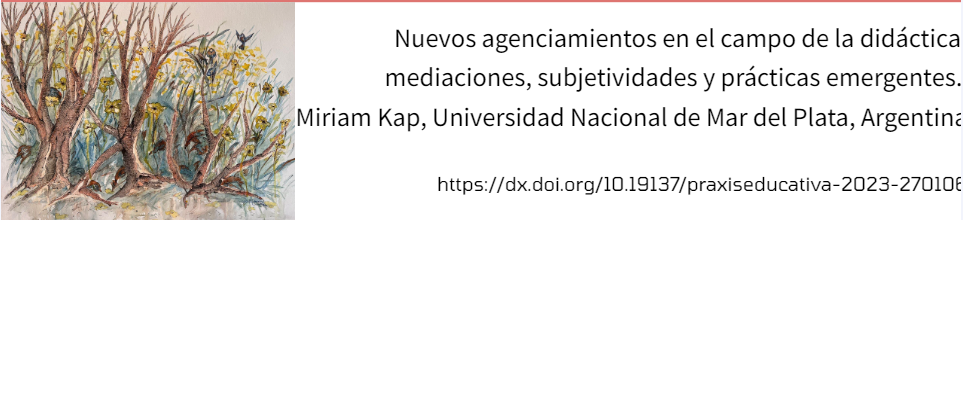Novos arranjos no campo da didática: mediações, subjetividades e práticas emergentes
DOI:
https://doi.org/10.19137/praxiseducativa-2023-270106Palavras-chave:
Agência, Coletivos, Didática, Design, Ensino, MediaçõesResumo
O campo da didática, como objeto de análise e discussão, expande-se a partir das novas mediações e modos de construção do conhecimento que se entrelaçam com práticas e subjetividades emergentes. Este artigo apresenta a necessidade de reconhecer o modo como as expansões didáticas em redes, plataformas e dispositivos transformam a experiência educacional e convidam a habitar processos imersivos em tramas culturais heterogêneas. As tensões que ocorrem nas concepções que envolvem as ampliações das práticas docentes em construções coletivas são abordadas e contemplam as abordagens de múltiplas linguagens, bem como de tempos e espaços alternativos para ensinar e aprender. Propõe-se dar lugar à possibilidade de reconhecer novos arranjos e perspectivas contra-hegemônicas de didáticas que discutam com as tradições, com os movimentos que se impõem com uma pretensão normativa e com as omissões que velam diferenças, desigualdades e exclusões.
Downloads
Referências
Barbero, J.M. (1999). La educación en el ecosistema comunicativo. Comunicar, 13, 13-21
Baricco, A. (2019) The Game. Anagrama.
Barthes, R. (2002). Variaciones sobre la escritura. Paidós.
Bergson, H. (1963). La evolución creadora. En H. BERGSON, Obras Escogidas. Aguilar.
Camilloni, A. y cols. (1996) Corrientes Didácticas Contemporáneas. Paidós.
De Alba, A. (2020). Currículo y operación pedagógica en tiempos de COVID-19. Futuro incierto. En: H. Casanova Cardiel (Coord.), Educación y pandemia: una visión académica (pp. 289-294). Ciudad de México: Universidad Nacional Autónoma de México, Instituto de Investigaciones sobre la Universidad y la Educación. Disponible en: http://132.248.192.241:8080/xmlui/bitstream/handle/IISUE_UNAM/565/DeAlbaA_2020_Curriculo_y_operacion.pdf?sequence=3&isAllowed=y
Deleuze, G., & GUATTARI, F. (1978). Kafka. Por una literatura menor. Editorial Nacional
Deleuze, G., & GUATTARI, F. (1985). El Anti Edipo. Capitalismo y Esquizofrenia. Paidós
Deleuze, G., & GUATTARI, F. (1994). Mil Mesetas. Capitalismo y Esquizofrenia. Pre-Textos.
Deleuze, G., & GUATTARI, F. (1994b). Rizoma. Ediciones Coyoacán.
Dewey, J. (2010 [1938]). Experiencia y Educación. Biblioteca Nueva.
Deleuze, G. (2012) "¿Qué es el acto de creación?", en Revista Fermentario, URU, ISSN 1688 6151, N° 6, pág. 1-16. http://www.fermentario.fhuce.edu.uy/index.php/fermentario
Fenstermacher, G. (1989). ”Tres aspectos de la filosofía de la investigación en la enseñanza". En: WITTROCK, M. (1989) La investigación en la enseñanza I. Paidós
Gardner, H y Davis, K. (2014) La generación APP. Cómo los jóvenes gestionan su identidad, su privacidad y su imaginación en el mundo digital. Paidós
Hui, Y. (2020). Fragmentar el futuro. Ensayos sobre la tecnodiversidad. Caja Negra.
Jackson, P. (2010[1968]) La vida en las Aulas. Morata.
Kap, M. (2014). Conmovidos por las tecnologías. Pensar las prácticas desde la subjetividad docente. Prometeo.
Kap, M. (2020). Una didáctica transmedia: derivas sobre mutaciones y nuevas mediaciones en el campo de la didáctica. RAC - Revista Argentina de Comunicación- RAC 2020 | Año 8 Nº11 | ISSN en línea 2718-6164, 82-109.
Litwin, E. (1996) "El campo de la didáctica: la búsqueda de una nueva agenda". En: CAMILLONI, A. y cols. (1996) Corrientes Didácticas Contemporáneas. Paidós.
Litwin, E. (1997) Las configuraciones didácticas. Una nueva agenda para la enseñanza superior. Paidós
Maggio, M. (2018). Reinventar la clase en la universidad. Paidós
Parikka, J. (2021). Una geología de los medios. Caja Negra.
Prigogine, I. (1993). ¿Tan solo una ilusión? Una exploración del caos al orden. Tusquets
Rancière, J. (2007) El maestro ignorante. Libros del Zorzal
Sadin, E. (2017). La Humanidad Aumentada. La administración digital del mundo. Caja Negra.
Sadin, E. (2022). La era del individuo tirano. El fin del mundo común. Caja Negra.
Simondon, G. (2013). Imaginación e Invención. Cactus.
Van Dijck, J. (2016). La cultura de la conectividad. Una historia crítica de las redes sociales. Siglo XXI.
Williams, R. (2000) Marxismo y Literatura. Península

Publicado
Edição
Seção
Licença
Aviso de direitos autorais
Comitê Editorial Revista Práxis Educativa:
Declaro que sou o autor do artigo intitulado (nome do artigo), que o mesmo é original e de minha autoria e que não foi publicado anteriormente em qualquer outro formato ou meio. Declaro saber que a revista não me cobrará nenhum tipo de taxa em hipótese alguma, nem receberei qualquer tipo de remuneração monetária.
Caso seja aceito para publicação na Práxis Educacional, autorizo a referida revista a publicá-lo digitalmente e a divulgá-lo em suas redes sociais.
Se o trabalho for publicado, aderi à licença Creative Commons denominada "Atribuição - Compartilhamento Não Comercial pela mesma Licença CC BY-NC-SA", por meio da qual é permitido copiar, reproduzir, distribuir, comunicar publicamente o trabalho e gerar trabalhos derivados , desde que o autor original seja citado e reconhecido. Esta licença está em uso desde setembro de 2018. Em 2016 foi aderido ao CC BY NC ND 4.0; e nos anos de 2017 e 2018 (janeiro-agosto) CC BY NC 4.0.
Esta licença CC BY-NC-SA Share Alike não permite, entretanto, o uso comercial da obra. Como autor, a revista poderá estabelecer acordos adicionais para a distribuição não exclusiva da versão do trabalho publicado na revista, permite-me autoarquivar os artigos publicados, na sua versão post-print, em repositórios institucionais, temáticos , páginas web pessoais ou qualquer outro uso relevante. com o reconhecimento de ter sido publicado pela primeira vez nesta revista.
SA Práxis Educacional adere à DORA (Declaração sobre Avaliação de Pesquisa) assinada em São Francisco, Califórnia, em 16 de dezembro de 2012, e à Declaração do México (Declaração Conjunta LATINDEX - REDALYC - CLACSO - IBICT).














_(1)2.png)


3.png)











_(2).png)






2.jpg)









